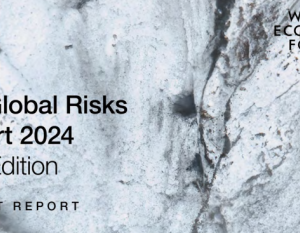The Global Risks Report 2024: Understanding the Challenges Ahead for Egypt and the MENA Region

Introduction:
The World Economic Forum's Global Risks Report 2024, a comprehensive and insightful analysis of potential global risks over the next decade, was released on January 10, 2024. This report, produced in partnership with Zurich Insurance Group and Marsh McLennan, has garnered significant attention for its detailed examination of various risks against the backdrop of rapid technological change, economic uncertainty, a warming planet, and ongoing conflicts.
Content and Importance of the Report:
The Global Risks Report 2024 stands out for its holistic approach to assessing risks, involving over 1,400 global experts, policymakers, and industry leaders in its survey. It highlights critical areas such as climate change, biodiversity loss, AI-generated misinformation and disinformation, and societal polarization as top global risks. The report also emphasizes the growing concerns over the persistent cost-of-living crisis, with economic uncertainty and technological divides as pressing issues.
Global Risks:
The report identifies extreme weather events, critical changes to Earth systems, biodiversity loss, ecosystem collapse, natural resource shortages, and pollution as the top five of the ten most severe risks. These environmental risks dominate the landscape over all timeframes and are viewed differently by various sectors. The private sector sees these risks materializing over a longer timeframe, while civil society and government prioritize them in the short term.
MENA Region and Egypt Specifics:
For the MENA region, and particularly Egypt, the report underscores a few specific challenges. Economic forecasts for Egypt in 2024 predict a moderate acceleration , influenced by rising foreign direct investment and government capital spending. However, the growth is expected to remain below the historical trend, impacted by a challenging operating environment, inflation, and borrowing costs. In the broader MENA region, monetary policies are expected to diverge, with Egypt and Tunisia continuing their tightening cycle to contain inflation and support weakening currencies.
The report also notes that hydrocarbon exporters in the MENA region, unlike Egypt, are expected to maintain surpluses, albeit smaller, in their external positions in 2024. In contrast, hydrocarbon importers like Egypt will likely see their current account deficits widen due to weaker growth in key trading partners and other factors.
Response and Strategy:
The Global Risks Report 2024 calls for a rethinking of actions to address these risks. It suggests focusing global cooperation on building guardrails for disruptive emerging risks and recommends localized strategies to mitigate global risks' impact. It highlights the role of both public and private sectors in building resilience at organizational, country, and international levels.
Conclusion:
The World Economic Forum's Global Risks Report 2024 presents an essential framework for understanding and preparing for the challenges ahead. For Egypt and the MENA region, the report offers valuable insights that can guide policymakers, businesses, and civil society in navigating a rapidly evolving risk landscape. Stakeholders can leverage this report to develop strategies that address both current and future risks, ensuring sustainable growth and stability in the region.
For more detailed information and insights, the full report can be downloaded from here.
Sources:
World Economic Forum's Global Risks Report 2024 (ESG Mena)
Global Risks 2024: Disinformation Tops Global Risks 2024 as Environmental Threats Intensify (MENAFN.COM)
GCC Will Drive MENA Growth In 2024 (Fitch Solutions)
MENA Macro Key Themes For 2024: Wider Gap Between GCC And Rest Of MENA (Fitch Solutions)


